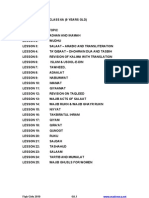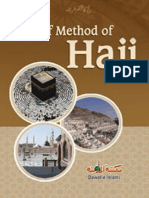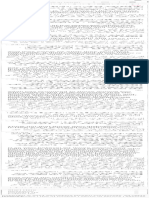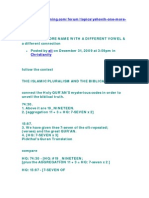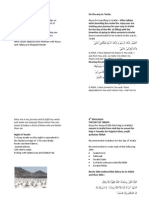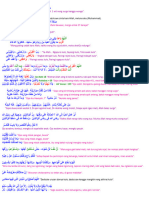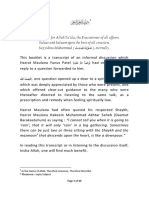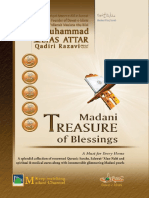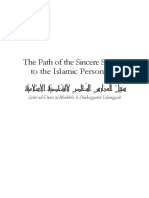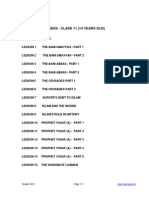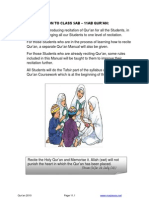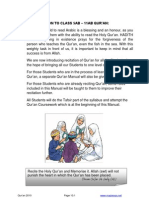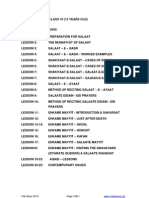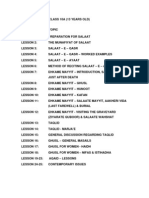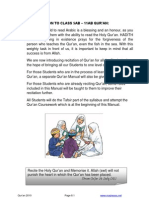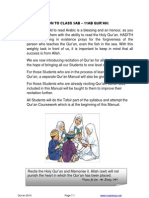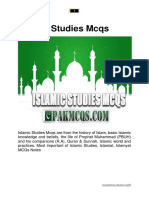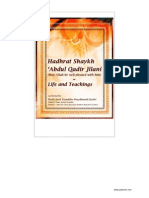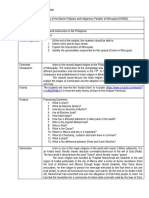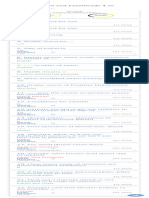Fiqh Girls 2010 Page 9A.1
Fiqh Girls 2010 Page 9A.1
Uploaded by
almustafaphilsCopyright:
Available Formats
Fiqh Girls 2010 Page 9A.1
Fiqh Girls 2010 Page 9A.1
Uploaded by
almustafaphilsOriginal Title
Copyright
Available Formats
Share this document
Did you find this document useful?
Is this content inappropriate?
Copyright:
Available Formats
Fiqh Girls 2010 Page 9A.1
Fiqh Girls 2010 Page 9A.1
Uploaded by
almustafaphilsCopyright:
Available Formats
FIQH SYLLABUS – CLASS 9 (12 YEARS OLD)
LESSON: TOPIC
LESSON 1: TRANSLATION OF ADHAN AND IKAMAH
LESSON 2 - 3: TRANSLATION OF SALAAT
LESSON 4: MUTAHHIRAAT INTRODUCTION & EXPLANATION
OF WATER
LESSON 5: MUTAHHIRAAT: EARTH, SUN, ISTIHALA & INQILAB
EXPLAINED
LESSON 6: MUTAHHIRAAT: INTIQAL, ISLAM & TABA’IYAT EXPLAINED
LESSON 7: MUTAHHIRAAT: ZAWAL-E-AIN, GHAIBAT-E-MUSLIM
EXPLAINED
LESSON 8: MUTAHHIRAAT: ISTIBRA & REMAINING BLOOD FROM
SLAUGHTER EXPLAINED
LESSON 9: DETAILS ON NAJASAT 1
LESSON 10: DETAILS ON NAJASAT 2
LESSON 11: GHUSL – GENERAL MASAILS
LESSON 12: HOW TO PERFORM GHUSL
LESSON 13: GHUSL FOR WOMEN - HAIDH
LESSON 14: GHUSL FOR WOMEN – NIFAS & ISTIHADHA
LESSON 15: TAYAMMUM
LESSON 16: METHOD OF PERFORMING TAYAMMUM
LESSON 17: INTRODUCTION TO JABIRA
LESSON 18: PRACTICAL APPLICATION OF JABIRA
LESSON 19: SHAKIYAAT-E-SALAAT – CASES OF DOUBTS
LESSON 20: SHAKIYAAT-E-SALAAT – CASES OF DOUBTS
LESSON 21: SHAKIYAAT-E-SALAAT – SALAAT-E-EHTIYAT
LESSON 22: SHAKIYAAT-E-SALAAT – SAJDAH-E-SAHV
LESSON 23: NAFILA
LESSON 24: NADHR, ‘AHD & QASAM
LESSON 24: CONTEMPORARY ISSUES
Fiqh Girls 2010 Page 9A.1 www.madressa.net
LESSON 1: TRANSLATION OF ADHAN AND IKAMAH
ADHAN - The Call to Salaat
Allah is the Greatest 4 times åjäJô·òA åÉé}¼»òA
I bear witness there is no god
but Allah.
2 times Éé}¼»A úÜêA äÉ}»êA úÜ æÆòA åfäÈqòA
I bear witness Muhammad is the
messenger of Allah
2 times åÉé}¼»A ó¾æÌåmìi AçfìÀäZå¿ ìÆòA åfäÈæqòA
I bear witness Ali is the beloved
of Allah.
2 times åÉé}¼»A íÓê»ìË îÏê¼ä§ ìÆòA åfäÈæqòA
Hasten to prayer 2 times êÑòÝìv»A Óò¼ä§ ìÏäY
Hasten to success 2 times `òÝä°ô»A Óò¼ä§ ìÏäY
Hasten to the best deed 2 times ½äÀä¨ô»A øjæÎäa Óò¼ä§ ìÏäY
Allah is the Greatest 2 times jäJô·òA åÉé}¼»òA
There is no god but Allah 2 times åÉé}¼»A úÜêA äÉ}»êA òÜ
IKAMAH – The Recitation Just Before Salaat
Allah is the Greatest 2 times jäJô·òA åÉé}¼»òA
I bear witness there is no god
but Allah
2 times Éé}¼»A úÜêA äÉ}»êA úÜ æÆòA åfäÈqòA
I bear witness Muhammad is the
messenger of Allah
2 times Éé}¼»A ó¾æÌåmìi AçfìÀäZå¿ ìÆòA åfäÈæqòA
I bear witness Ali is the beloved
of Allah
2 times Éé}¼»A íÓê»ìË îÏê¼ä§ ìÆòA åfäÈæqòA
Hasten to prayer 2 times êÑòÝìv»A Óò¼ä§ ìÏäY
Hasten to success 2 times `òÝä°ô»A Óò¼ä§ ìÏäY
Hasten to the best deed 2 times ½äÀä¨ô»A øjæÎäa Óò¼ä§ ìÏäY
Indeed the prayer has begun 2 times ÑòÝìv»A êOä¿Bä³ æfä³
Allah is the Greatest 2 times jäJô·òA åÉé}¼»òA
There is no god but Allah Once Éé}¼»A úÜêA äÉ}»êA òÜ
Fiqh Girls 2010 Page 9A.2 www.madressa.net
ADHAN AND IKAMAH COMPARED
ADHAN - call for Salaat IKAMAH-call to start Salaat
X4 jäJô·òA åÉé}¼»òA X2 jäJô·òA åÉé}¼»òA
Allah is the greatest
X2 åÉé}¼»A úÜêA äÉ}»êA úÜ æÆòA åfäÈqòA X2 åÉé}¼»A úÜêA äÉ}»êA úÜ æÆòA åfäÈqòA
I bear witness there is no God but Allah
X2 åÉé}¼»A ó¾æÌåmìi AçfìÀäZå¿ ÆòA åfäÈæqòA X2 åÉé}¼»A ó¾æÌåmìi AçfìÀäZå¿ ÆòA åfäÈæqòA
I bear witness Muhammad is the messenger of Allah
X2 åÉé}¼»A íÓê»ìË îÏê¼ä§ ìÆòA åfäÈæqòA X2 åÉé}¼»A íÓê»ìË îÏê¼ä§ ìÆòA åfäÈæqòA
I bear witness Ali is the beloved of Allah
X2 êÑòÝìv»A Óò¼ä§ ìÏäY X2 Ñê òÝìv»A Óò¼ä§ ìÏäY
Hasten to prayer
X2 ø`òÝä°ô»A Óò¼ä§ ìÏäY X2 ø`òÝä°ô»A Óò¼ä§ ìÏäY
Hasten to success
X2 ø½äÀä¨ô»A øjæÎäa Óò¼ä§ ìÏäY X2 ø½äÀä¨ô»A øjæÎäa Óò¼ä§ ìÏäY
Hasten to the best deed
Not to be recited in Adhan X2 ÑòÝìv»A êOä¿Bä³ æfä³
Indeed the Salaat has begun
X2 åjäJô·òA åÉé}¼»òA X2 åjäJô·òA åÉé}¼»òA
Allah is the greatest
X2 åÉé}¼»A úÜêA äÉ}»êA òÜ X1 åÉé}¼»A úÜêA äÉ}»êA òÜ
There is no god but Allah
Fiqh Girls 2010 Page 9A.3 www.madressa.net
LESSON 2 - 3: TRANSLATION OF SALAAT
STEP BY STEP ON HOW TO PRAY
1. NIYYAT: I AM OFFERING ________PRAYERS,
________ RAKAATS,
Éé}¼»A Óò»êA çÒäIæjå³
QURBATAN ILAL LAH
ONLY FOR THE PLEASURE OF ALLAH
2. TAKBIRATUL IHRAM
ALLAHU AKBAR
ALLAH IS THE GREATEST
3. QIYAM – SURATUL FATIHA
In the name of Allah the most Kind,
ÁæÎêYìj»A øÅ{ÀæYìj»A êÉé}¼»A øÁænøI
the Most Merciful; äÅæÎêÀò¼{¨ô»A ÷êLäi êÉé}¼ê» åfæÀäZô»òA
All praise is to Allah; The Kind, The
Merciful; øÁæÎêYìj»A øÅ{ÀæYìj»A
Master of the Day of Judgement;
You alone we Worship & You alone ÅæÍø÷f»A øÂæÌäÍ ê¹ê¼{¿
we ask for Help;
Keep us on the Right Path; ÅæÎê¨äNænäà òºBìÍêA äË åfåJæ¨äà òºBìÍêA
The Path of those whom You have
Favoured; ÁæÎê´äNænåÀô»A ò¢Aäj÷øv»A BäÃêfæÇêA
Not the Path of those with whom
You are angry and also not of those ÁøÈæÎò¼ä§ äOæÀä¨æÃòA äÅæÍêhú»A ò¢Aäjêu
who have gone astray ÁøÈæÎò¼ä§ øLæÌåzæ¬äÀô»AøjæÎä«
ÅæÎø÷»Fìz»AòÜ äË
4. QIYAM – SURATUL IKHLAS
In the name of Allah the Most Kind, the ÁæÎêYìj»A øÅ{ÀæYìj»A êÉé}¼»A øÁænøI
Most Merciful;
Say Allah is One; fäYòA åÉé}¼»A äÌåÇ ô½å³
He needs nothing, but everything else
needs Him; fäÀìv»A åÉé}¼»òA
He has no children and He has no
parents; fò»æÌåÍ æÁò» äË åfê¼äÍ æÁò»
And there is none other equal to Him
fäYòA AçÌå°ó· åÉú» æÅó¸äÍ æÁò» äË
Fiqh Girls 2010 Page 9A.4 www.madressa.net
LESSON 2 - 3: TRANSLATION OF SALAAT
STEP BY STEP ON HOW TO PRAY
5. RUKU’ Glory be to Allah, the Supreme,
and I praise Him.
O Allah, send your blessings to êÊêfæÀäZøI äË øÁæÎê¤ä¨ô»A äÏøéIäi äÆBäZæJåm
Prophet Muhammad (S) and his
family.
ë fìÀäZå¿ ø¾}A ìË ëfìÀäZå¿ Ó}¼ä§ ÷ø½äu ìÁåÈé}¼»òA
6. QIYAM AFTER RUKU’
Allah hears and accepts
anyone who praises Him.
ÊäfêÀäY ÅäÀê» åÉé}¼»A ä©êÀäm
Allah is the Greatest. åjäJô·òA åÉé}¼»A
7. SAJDAH Glory be to Allah the Most
High and I praise Him
ÊêfæÀäZøI äË Ó}¼æ§æòÜA äÏøéIäi äÆBäZæJåm
O Allah, send your blessings
to Prophet Muhammad (S)
and his family. ëfìÀäZå¿ ø¾}A ìË ëfìÀäZå¿ Ó}¼ä§ ÷ø½äu ìÁåÈé}¼»òA
8. JULOOS
Allah is greater than
anything or anyone; jäJô·òA åÉé}¼»A
I seek forgiveness from
Allah, my Lord, and turn to
Him in repentance; Allah is ÉæÎò»êA åLæÌåMòA äË æÏøéIäi äÉé}¼»A åjê°æ¬äNæmòA
greater than anything or
anyone.
jäJô·òA åÉé}¼»A
9. DHIKR FOR WHEN RISING FOR THE NEXT RAKAAT:
I stand and sit with the help and
strength of Allah åfå¨æ³òA äË åÂæÌå³òA êÉêMìÌå³ äË êÉé}¼»A ø¾æÌäZøI
Fiqh Girls 2010 Page 9A.5 www.madressa.net
LESSON 2 - 3: TRANSLATION OF SALAAT
STEP BY STEP ON HOW TO PRAY
IN THE 2ND RAKAAT AFTER THE RECITATION IN QIYAM (QIRAAT) - SURA AL-FATIHA AND
SURA AL-IKHLAS, AFTER THAT DO QUNOOT:
10. QUNOOT:
O our Lord! Bestow
upon us good in çÒäÄänäY BäÎæÃíf»A Óê¯ BäÄêM}A BäÄìIäi
this world and good
in the Hereafter, øiBìÄ»A äLAähä§ BäÄê³ ìË çÒäÄänäY êÑäjêaæ}ÜA Óê¯ ìË
and protect us from
the punishment of
the fire
RUKU, QIYAM, SAJDAH, JULOOS, SAJDAH, JULOOS - ALL JUST LIKE THE 1ST RAKAAT
WHILE STILL IN JULOOS:
- AT THE END OF THE 2ND RAKAAT RECITE TASHAHUD AND SALAAM IF IT IS A 2 RAKAAT
SALAAT
- AT THE END OF THE 2ND RAKAAT RECITE ONLY TASHAHUD IF IT IS A 3 OR 4 RAKAAT
SALAAT AND RISE FOR THE NEXT RAKAAT.
-
11. TASBIHAT-E-ARBA’ 3 TIMES IN THE 3RD AND 4TH RAKAAT IN QIYAM:
Glory be to Allah. êÉé}¼»A äÆBäZæJåm
And all praise is for Him. êÉé}¼ê» åfæÀäZô»A äË
And there is no God but Allah. åÉé}¼»A úÜêA äÉ}»êA òÜ äË
And He is the Greatest. jäJô·òA åÉé}¼»A äË
Fiqh Girls 2010 Page 9A.6 www.madressa.net
LESSON 2 - 3: TRANSLATION OF SALAAT
STEP BY STEP ON HOW TO PRAY
12. TASHAHUD
I testify that there is none
worth worshipping except åÉò» ò¹æÍøjäqòÜ åÊäfæYäË åÉé}¼»A úÜêA äÉ}»êA ÷à æÆòA åfäÈæqòA
the Almighty Allah, Who is
One and has no partner, and
I testify that Muhammad (S) åÉó»æÌåmäi äË åÊåfæJä§ AçfìÀäZå¿ ìÆòA åfäÈæqòA äË
is His servant and
messenger. O Allah! Send
Your blessings on ëfìÀäZå¿ ø¾}A ìË ëfìÀäZå¿ Ó}¼ä§ ÷ø½äu ìÁåÈé}¼»òA
Muhammad (S) and his
progeny.
13. SALAAM
O Prophet! Allah's peace,
blessings and grace be åÉåMBò·äjäI äË êÉé}¼»A åÒäÀæYäi äË íÏøJìÄ»A BäÈíÍòA ò¹æÎò¼ä§ åÂòÝìn»òA
upon you!
Allah's peace be on us,
those offering prayers - äÅæÎêZê»Bìv»A êÉé}¼»A êeBäJê§ Ó}¼ä§äË BäÄæÎò¼ä§ åÂòÝìn»òA
and upon all pious
servants of Allah!
åÉåMBò·äjäI äË êÉé}¼»A åÒäÀæYäi äË æÁó¸æÎê¼ê§ åÂòÝìn»òA
Allah's peace, blessings
and grace be on you
believers!
Fiqh Girls 2010 Page 9A.7 www.madressa.net
LESSON 4: MUTAHHIRAAT INTRODUCTION & EXPLANATION OF WATER
Mutahhiraat are those things that make Najis things Pak. 149
Taba’iyat
Water
Islam
Sun
Zawal e Ain
Mutahhiraat Earth
Inqilab
Intiqal
Ghaibate
Muslim
Istihala
Remaining
Blood After
Slaughter Istibra
1. Water
WATER
MUTLAQ MUDHAF
[PURE WATER] [MIXED WATER e.g. milk,
vinegar, soft drink, etc]
WATER WHICH HAS NOT
CHANGED COLOUR, TASTE CANNOT MAKE NAJIS
OR SMELL. CAN MAKE THINGS PAAK. BECOMES NAJIS
NAJIS THINGS PAAK WHEN IT COMES IN CONTACT
WITH NAJIS THINGS
EXAMPLES OF MUTLAQ WATER
RAIN WATER KUR
RUNNING WATER e.g. tap water 31/2 x 31/2 x 31/2 in length, width
WELL WATER and depth
ABE KATHIR [Still water >Kur] Volume = 42.875 cubic span
ABE KALEEL [Still water < Kur]
Fiqh Girls 2010 Page 9A.8 www.madressa.net
Water Makes Najis Things Pak If: 150
- It is Pure and not mixed
- It is Pak itself
- It does not become Mudhaf (mixed) when a Najis thing is being washed
- No small particles remain after washing the Najis thing
Water that is less than Kur becomes najis
When it comes into contact with Najasaat 26
Examples of cleaning Najasat with water
ONCE WITH ONCE WITH 7 TIMES WITH 7 TIMES WITH
ABE KATHIR ABE KALEEL ABE KALEEL ABE KATHIR
Fiqh Girls 2010 Page 9A.9 www.madressa.net
LESSON 5: MUTAHHIRAAT: EARTH, SUN, ISTIHALA & INQILAB EXPLAINED
2. Earth 184
The earth makes the soles of our feet and shoes Pak if:
- The earth is Pak
- The earth is dry
- The Najasaat has stuck from the earth
- The thing that has stuck on the sole of the foot or shoe is cleared.
3. Sun 192
The Sun makes the earth, buildings and walls Pak if:
- The Najis area is sufficiently wet
- Any Najasaat is stuck it is removed first
- There is no obstruction between the Najis area and the Sun
- Only the Sun makes it dry and that it’s not too windy
- The whole Najis area becomes dry in one go.
NB - The Sun DOES NOT make the trees, grass, windows or doors PAK. 193
Fiqh Girls 2010 Page 9A.10 www.madressa.net
4. Istihala
It literally means TRANSFORMATION
If a Najis thing changes in such a way that it cannot be called what it originally was it
becomes Pak. 196
E.g. If Najis wood is burnt and is reduced to ashes, then the ashes are Pak
Najis wood burning Pak ashes
NB
However, if the change is not such that it cannot be associated to the original Najis
thing, then it doesn’t become Pak. e.g. If Najis wheat is ground into flour or used to bake
bread it doesn’t become Pak.
Najis Najis Najis
5. Inqilab
It literally means CHANGE
Any Liquor which becomes vinegar by itself, or by mixing it with vinegar or salt,
becomes Pak. 199
Pak Vinegar
Najis wine
Fiqh Girls 2010 Page 9A.11 www.madressa.net
LESSON 6: MUTAHHIRAAT: INTIQAL, ISLAM & TABA’IYAT EXPLAINED
6. Intiqal
It literally means TRANSFER OR CHANGE OF PLACE
If an insect that is bloodless sucks the blood of human being, after a short period of time
when this blood becomes part of the insect’s body, it is Pak.
210
MOSQUITO SUCKS BLOOD OF HUMAN
BLOOD IN THE AFTER SOMETIME
MOSQUITO BLOOD OF HUMAN
BECOMES PAK BECOMES MOSQUITO’S
7. Islam
When a Non-Muslim believes in the Oneness of God and the Prophethood of
Muhammad (S), in whatever language, s/he becomes a Muslim and is Pak. 212
Pak Pak Pak
8. Taba’iyat
This is when a Najis thing becomes Pak as a result of another thing becoming Pak.
215
E.g. When a Kafir becomes a Muslim, his or her children who are not yet Baligh will also
become Pak. 217
Mother becomes Na-baligh child
a muslim becomes pak
Fiqh Girls 2010 Page 9A.12 www.madressa.net
LESSON 7: MUTAHHIRAAT: ZAWAL-E-AIN, GHAIBAT-E-MUSLIM EXPLAINED
9. Zawal-e-Ain
This is the removal of Najis-ul-Ayn. That is, if there is a Najasat on the body of an
animal, like blood, for example, it becomes Pak when the Najasat is rubbed off or just
disappears. 222
Najasat Pak
10. Ghaibat-e-Muslim
When the body, clothes, household utensils, etc, that have been in the possession of a
Muslim, who is a strict follower of the Shariah, become Najis and thereafter, the Muslim
disappears, the Najis thing can be considered Pak, if you believe that s/he must have
washed them. 227
Najis Goes away Returns Pak
Fiqh Girls 2010 Page 9A.13 www.madressa.net
LESSON 8: MUTAHHIRAAT: ISTIBRA & REMAINING BLOOD FROM
SLAUGHTER EXPLAINED
11. Istibra
Istibra Means Halaal Animals Become Najis When They Eat Refuse Of Man 226
COW, GOAT OR CHICKEN BECOMES NAJIS WHEN THEY EAT REFUSE OF MAN
THESE ANIMALS CAN BE MADE PAK BY KEEPING THEM AWAY FROM NAJIS FOOD
AND THEN FEEDING THEM WITH PAK FOOD FOR A SET NUMBER OF DAYS. FOR ……….
3 DAYS 20 DAYS 10 DAYS
12. Remaining blood from Slaughter. 231
When a halaal animal is Slaughtered according to Shariat, and when its
blood flows out in normal quantities, the remaining blood in the body is
tahir
Fiqh Girls 2010 Page 9A.14 www.madressa.net
LESSON 9: DETAILS ON NAJASAT 1
1. Urine & Stool 85
The Urine and Stool of animals whose meat is Haraam and whose blood comes out
with a gush is NAJIS.
However, the Urine and Stool of any animals who do not have both these requirements,
is PAK.
E.g.1: An elephant E.g. 2: A cow E.g. 3: A snake
2. Semen 88
The semen of human beings, and of every animal whose blood comes out with a gush,
when its jugular vein is cut, is Najis.
3. Dead Bodies 89
All living things whose blood gushes out are NAJIS when they die.
The dead body of a Muslim becomes PAK after being given Ghusl according to the
Islamic Shariah.
Fiqh Girls 2010 Page 9A.15 www.madressa.net
LESSON 10: DETAILS ON NAJASAT 2
4. Blood 97
This is NAJIS of all living things whose blood comes out with a gush, regardless of
whether their meat is Halaal or Haraam.
However, the remaining blood of animals whose meat is HALAAL is PAK, if they have
been slaughtered according to the Islamic Shariah. 98
5. Dogs And Pigs 106
All dogs and pigs living on land are NAJIS, to the extent that their hair, nails, teeth,
bones and sweat are also NAJIS.
6. Kafirs 107 & 108
A Kafir is a person who does not believe in God or the Day of Judgement – they are
NAJIS to the extent that their hair, nails, teeth, bones and sweat are also NAJIS.
7. Alcoholic Drinks 112
All kinds of alcoholic drinks are NAJIS, whether it a liquid intoxicant or a mild beer.
Fiqh Girls 2010 Page 9A.16 www.madressa.net
LESSON 11: GHUSL – GENERAL MASAILS
It means to have a bath in order to wash the body.
Ghusl
Wajib Mustahab
Janabat Nadhr / Jum’a Eid ul Fitr
Qasam / Ahad
Mayyit Haidh, Nifas, Refer to 651
Mase Mayyit Istihadha for a whole list
Conditions Of Ghusl
- Water must be Pak, pure (Mutlaq) and taken with permission (Mubah) 386
- Place where Ghusl is performed must be Mubah 386
- Niyyat should be of Qurbatan ilallah 364
- It must be performed without help 386
- All obstructions must be removed 383
Remember: There Is No Need: 378
- To make the body Pak before starting Ghusl 378
- For the body to be washed downwards from the head 386
- For Tartib – delay between different actions of Ghusl is allowed 386
Methods of Ghusl 366
Tartibi Stages or Sequence
Irtemasi Instant or Gradual Immersion
Fiqh Girls 2010 Page 9A.17 www.madressa.net
LESSON 12: HOW TO PERFORM GHUSL
Ghusl-e-Tartibi = Ghusl in Stages & Sequence. 367
I am doing Ghusl for Wash head to neck
the pleasure of Allah,
Qurbatan iIallah
Wash the
right half Wash the
side of the left half
body side of the
body
Ghusl-e-Tartibi can also be performed by washing the whole body together after
washing the head and neck
Ghusl-e-Irtemasi = Instant or Gradual immersion. 373
This is by washing the whole body at the same time – and that can only be
done by submerging the whole body into the water by diving into a river, sea
or swimming pool.
If however, you wish to perform the Ghusl-e-Irtemasi
gradually, then it is necessary that:
- The whole body is out of the water before starting the Ghusl.
- Then you submerge your body gradually into the water with the intention of
Ghusl. 374
When Performing Ghusle Irtimasi In One Go, You Must Ensure That The Water Reaches
All Parts Of The Body At One Time.
Fiqh Girls 2010 Page 9A.18 www.madressa.net
LESSON 13: GHUSL FOR WOMEN - HAIDH
Every adult and healthy girl has periodical discharge of blood. Before every prayer, a
woman has to purify herself from such discharge.
THE PURIFICATION REQUIRED FOR HAIDH, ISTIHADHA AND NIFAS IS
GHUSL.
Women have 3 types of discharge of blood, namely:
1. Haidh
2. Istihadha
3. Nifas
Haidh 440 – 455
Menstruation and is generally known as A PERIOD
- It is a discharge from the womb for a few days
- It is usually thick and warm
- It is generally black or dark red in colour
- It is discharged with some pressure and irritation
HAIDH = Lasts between 3 – 10 days
There Are 6 Types Of Women In Haidh 484
I HAVE MY MY PERIODS
PERIODS FOR MY PERIODS
START ON THE
5 DAYS START ON THE
5TH OF EVERY
EVERY MONTH 5TH OF EVERY
MONTH & LAST
MONTH
FOR 5 DAYS
I HAVE FORGOTTEN
MY PERIOD DATE
MY PERIODS WHEN & HOW LONG
IS NOT FIXED
HAVE STARTED MY PERIODS GO ON
NOR ARE THE
THIS MONTH FOR??
NUMBER OF DAYS
Fiqh Girls 2010 Page 9A.19 www.madressa.net
LESSON 14: GHUSL FOR WOMEN – NIFAS & ISTIHADHA
Nifas 514
Bleeding after childbirth.
- There is no minimum time for Nifas,
- The maximum number of days for which it can appear is the same number of days
as your monthly period and up to 10 days.
Things That Are Haraam In Haidh 456 And Nifas 519 [Ref 361]
- Praying and other acts of worship that require Ghusl, Wudhu or Tayammum
- Touching the writing of Qur'an or the Names of Allah, in whichever language. It is
better not to touch the names of the Holy Prophet (S) or Imams (A) or Bibi Fatima
(A).
- Entering any Mosque. If necessary you may pass the mosque without stopping.
- Entering a Mosque to take out or even place anything in it, HOWEVER,
- As far as Masjidun Nabawi and Masjidul Haraam are concerned, even passing
through them is not allowed.
- Reciting those verses of the Holy Qur’an in which there are Wajib Sajdahs. Those
are:
Suratul Alif Laam Meem Sajdah, [32:15]
Suratul Ha Meem Sajdah, [41:38]
Suratun Najm, [53:62]
Suratul Alaq, [96:19]
Things That Are Makrooh In Haidh And Nifas 483
Istihadha
Blood discharged which is neither Haidh nor Nifas 398
- It can sometimes be thick
- It is generally yellowish and cold, but can be red or dark at times
- Usually there is no gush or irritation
ISTIHADHA = Less than 3 days OR More than 10 days
Fiqh Girls 2010 Page 9A.20 www.madressa.net
QALILA MUTAWASSITA QATHIRA
Little 399 Medium 399 Excessive 399
This Is When The This Is When The This Is When The
Blood Does Not Blood Penetrates Blood Exceeds
Penetrate The The Cotton Pad The Cotton Pad
Cotton Pad Used But Does Not After Soaking It
For Protection Exceed It
GHUSL NOT ONE DAILY ONE GHUSL
NECESSARY GHUSL FOR EACH SET
400 NECESSARY OF SALAAT
401 402
She is allowed to She is allowed to She is allowed to
pray more than pray more than one pray more than
one Salaat with Salaat with one one Salaat with
one Wudhu, Wudhu, unless one Wudhu,
unless there has there has been any unless there has
been any bleeding bleeding between been any bleeding
between the the Prayers 414 between the
Prayers 414 Prayers 414
WUDHU NECESSARY FOR EVERY SALAAT IN ALL CASES
Fiqh Girls 2010 Page 9A.21 www.madressa.net
LESSON 15: TAYAMMUM
We perform Tayammum when 655 - 691
There is no water available
It is not possible to get water, due to illness, weakness, or fear
It is harmful to one’s health
Using the water available will mean others will have to go without
Water is only enough to make the body or clothes Pak
There isn’t enough time to perform Wudhu or Ghusl
The only water available is Ghasbi
Tayammum can be done on 692 – 700
EARTH SAND / CLAY
Not Available Not Available
DUST
STONE
Not Available Not Available
SNOW / ICE
Not Available
MUD WALL
Not Available
Do NOT perform Tayammum – Pray Qadha later
The Things On Which Tayammum Is Performed
- Must be PAK 700
- Must not be GHASBI or USURPED 702
Fiqh Girls 2010 Page 9A.22 www.madressa.net
LESSON 16: METHOD OF PERFORMING TAYAMMUM
708
1. Niyyat 2. Strike both your palms on the
thing that you are doing
I am performing Tayammum on e.g. Earth
Tayammum (give
reason) Wajib
Qurbatan ilallah
3. Put both your palms where your 4. Wipe The Entire Part Of The
hair starts to grow and pull them Back Of The Right Hand With
down to the tip of your nose. The Palm Of The Left Hand And
Repeat The Same With The
Right Hand Over The Left
Mustahab Act:
To strike the hands on the earth again and wipe the back of the Hands again
709
713 – Unless you are performing 2 Tayammum
together, one instead of a Ghusl and the other instead of
Wudhu, there is no need to specify what the Tayammum is
f
Fiqh Girls 2010 Page 9A.23 www.madressa.net
LESSON 17: INTRODUCTION TO JABIRA
JABIRA - The material or the medicine used for bandaging wounds.
Wudhu Al-Jabira: Wudhu on the bandage or a splint, which has been fixed
on those parts of a person's body, which are related to
Wudhu
Ghusl Al-Jabira: Ghusl you have to perform on a bandage or splint, which
has been fixed on any part of your body.
You would perform wudhu al-jabira when:
- The Jabira cannot be removed
- Water is harmful to the wound
- When there is an un-bandaged wound
- When there is an un-bandaged fracture
How Would You Perform Wudhu Al-Jabira
For the unaffected areas, Wudhu will be performed as usual.
For the affected areas:
- If water is not harmful, then you will pour enough water for it to go
through the Jabira 335
- If water is harmful you will place a Pak piece of cloth over the wound
and pass a wet hand over that area, 332
- Also, if the Jabira is Najis, you will place a Pak piece of cloth over the
Jabira then pass a wet hand over that area.
When any part of Wudhu is partly covered with a Jabira but
there isn’t a fracture – you will perform Wudhu Al-Jabira
331
Fiqh Girls 2010 Page 9A.24 www.madressa.net
LESSON 18: PRACTICAL APPLICATION OF JABIRA
When To Do Wudhu Al-Jabira
Hands PARTLY
Face covered in
PARTLY Bandages. BUT
covered in NO FRACTURE Feet PARTLY
Bandages. covered in
BUT NO Bandages. BUT
FRACTURE NO FRACTURE
Head PARTLY
covered in
Bandages. BUT
NO FRACTURE
When To Do Wudhu Al-Jabira and Tayammum
Hands FULLY
covered in
Bandages. Or
Face FULLY
even OPEN
covered in
FRACTURE
Bandages. Or
even OPEN
FRACTURE
Head FULLY
covered in
Feet FULLY Bandages. Or
covered in even OPEN
bandages. Or FRACTURE
even OPEN
FRACTURE
Fiqh Girls 2010 Page 9A.25 www.madressa.net
LESSON 19: SHAKIYAAT-E-SALAAT – CASES OF DOUBTS
Even though Muslims try to pray their Salaat with the utmost care and
concentration, sometimes we doubt about how a certain part of the Salaat
was prayed.
There is every chance that we made an error in our prayers. If anybody
should have doubts about their Salaat, they should think for a moment about
their doubt and try to shake it off. If this fails, then they should act according to
the rules set down.
There are 23 cases of doubts (Shakiyaat) that may arise during Salaat:
6 of them can be ignored 1176
8 of them make Salaat Batil 1174
9 of them can be corrected 1208
Six Doubts That Can Be Ignored 1176
Did I do my 2nd
Did I perform my
sajdah?? Oh!
Asr prayers???
No! 1
"I am praying 3 rakaats for
Salaatul Maghrib, Wajib
[X3] Qurbatan Ilallah” [To seek the
pleasure of Allah]
Did I do
Ruku???
Hm!! Last rakaat I
had the same doubt.
This rakaat again! I
don’t know how
many rakaats I have
prayed!!
Fiqh Girls 2010 Page 9A.26 www.madressa.net
Don’t
Don’t know
know what I
what I have
have prayed
prayed !!
!!
Even in sunnat
Salaat, I am
Person in doubt
having
should follow the
doubts!!
one who is sure
Eight Doubts That Make Salaat Batil 1174
How many How many
rakaats have I rakaats have I
prayed in this prayed in this
Subh salaat Maghrib salaat
Am about to
do my 2nd
How many
sajdah but am
rakaats have I
wondering if
prayed
this is my 2nd
or 3rd rakaat??
Fiqh Girls 2010 Page 9A.27 www.madressa.net
Is this my 2nd, Is this my 2nd,
5th or 6th 6th or 7th
rakaat?? rakaat??
rd
Is this my 1st,
Is this my 3 , 2nd or 3rd
6th or 7th rakaat??
rakaat??
Fiqh Girls 2010 Page 9A.28 www.madressa.net
LESSON 20: SHAKIYAAT-E-SALAAT – CASES OF DOUBTS
Nine Doubts That Can Be Correct 1208
You can correct the following doubts without having to pray again if the doubt
occurs in a 4 rakaat salaat
WHEN DOUBT DECISION CORRECTION
WHETHER
After 2nd 2nd or 3rd Rakaat Take it as 3rd
Sajdah of
2nd Rakaat
After 2nd 2nd or 4th Rakaat Take it as 4th
Sajdah of
2nd Rakaat
After 2nd 2nd, 3rd or 4th Take it as 4th
Sajdah of Rakaat
AND
2nd Rakaat
After 2nd 4th or 5th Rakaat Take it as 4th
Sajdah of
2nd Rakaat
After 2nd 3rd or 4th Rakaat Take it as 4th
Sajdah of
OR
2nd Rakaat
Qiyam 4th or 5th Rakaat Sit down at
before Ruku once AND
OR & Recommended
Finish Salaat Precaution
Qiyam 3rd or 5th Rakaat Sit down at
before Ruku once AND
AND Recommended
Finish Salaat
Precaution
Qiyam 3rd, 4th or 5th Sit down at
before Ruku Rakaat once AND
& &
Finish Salaat Recommended
Precaution
Qiyam 5th or 6th Rakaat Sit down at
before Ruku once AND
+ Recommended
Finish Salaat
Precaution
& = Salaat-e-Ehtiyat (standing/sitting) = Sajdah-e-Sahv
Fiqh Girls 2010 Page 9A.29 www.madressa.net
LESSON 21: SHAKIYAAT-E-SALAAT – SALAAT-E-EHTIYAT
Salaat-e-Ehtiyat 1224
After finishing Salaat without looking away from Qiblah or doing anything that
makes Salaat batil, you remain seated or stand up depending on what is
required.
Method of Salat-e-Ehtiyat
"I am praying
Salaat-e-
Ehtiyat, 1
rakaat, Wajib
Qurbatan
Ilallah”
[Seeking the
pleasure of
Allah]
RECITE SURA AL-FATEHA
Fiqh Girls 2010 Page 9A.30 www.madressa.net
If you have to recite 2 Rakaat then you should stand up for the 2nd Rakaat
after Sajdah.
Fiqh Girls 2010 Page 9A.31 www.madressa.net
LESSON 22: SHAKIYAAT-E-SALAAT – SAJDAH-E-SAHV
Sajdah-e-Sahv becomes Wajib, when 1245
- You talk by mistake in Salaat
- You recite Salaam at the wrong place, by mistake
- You forget Tashahud.
- In a 4 Rakaat Salaat you have a doubt after the 2nd Sajdah as to
whether it is the 4th or 5th Rakaat or 4th or 6th Rakaat
- You added or left out by mistake any such thing, which is not Rukn.
If you forget one Sajdah or Tashahud but remember it before the
Ruku of the next Rakaat, you should return and perform it. If,
however, you remember after Salaat is completed, then you will
have to offer 2 Sajdah-e-Sahv as a recommended precaution.
1253
Method of Performing Sajdah-e-Sahv
Soon after finishing Salaat:
- Do Niyyat: "I am doing Sajdah-e-Sahv in lieu of Tashahud (or Salaam
or Sajdah or Qiyam, etc; as the case may be Wajib Qurbatan ilallah".
- Then go to Sajdah and say the following once.
o "BISMILLAHI WA BILLAHI ASSALAAMU ALAIKA
AIYUHAN-NABIYYU WA RAHMATULLAHI WA
BARAKATUH".
- Then rise from Sajdah and sit, but don't recite anything.
- Then go to Sajdah again and recite:
o "BISMILLAHI WA BILLAHI ASSALAAMU ALAIKA AIYUHAN-
NABIYYU WA RAHMATULLAHI WA BARAKATUH", as you
did in the first Sajdah,
- Then rise from Sajdah
- Recite Tashahud and Salaam.
If after the prayer, but before the Qadha of Sajdah or Tashahud, any actions
are done which invalidate Salaat, then it is necessary to do Qadha and
Sajdah-e-sahv and then repeat
the prayer as a recommended Salaat-e-Ehtiyat 1225
- Does not have a 2nd Surah or Qunoot
precaution. 1264
- Should be offered silently
- Its Niyyat should not be uttered
If you have forgotten Tashahud
or one Sajdah in the Salaat, it is
Wajib to do Qadha at once after
Salaat; then do Sajdah-e-sahv. 1270
Fiqh Girls 2010 Page 9A.32 www.madressa.net
LESSON 23: NAFILA
These are Mustahab prayers, which have been recommended for Muslims
and have much merit. There are 34 Raka'ats in total. How they are divided is
explained below:
BEFORE AFTER
FAJR SALAAT MAGHRIB SALAAT
4 RAKA'ATS STANDING
STANDING 2 RAKA'ATS
AFTER
BEFORE ISHA SALAAT
ZUHR SALAAT 34
1 RAKA'AT 2 SITTING
STANDING 8 RAKA'ATS
MIDNIGHT
BEFORE SALAAT-E-SHAB
ASR SALAAT
11 RAKA'ATS STANDING
STANDING 8 RAKA'ATS
More than 2 Raka'ats have to be offered in sets of 2 Raka'ats. The method of praying is the
same as Salaat-e-Fajr.
SALAAT-E-SHAB
The most important and highly recommended prayer amongst the Mustahab
prayers is Salaat-e-Shab. Another name for Salaat-e-Shab is Salaat-e-
Tahajjud.
BENEFITS OF SALAAT-E-SHAB
Cause For Forgiveness From Allah On The Day Of Judgement
Root of Faith Help With Questions in the Grave Devils Keep Away
Physically Fit Duas and Good Deeds Accepted Light of Knowledge
Key to Heaven Intercedes With Angle of Death Comfort in the Grave
Angels’ Friends Barrier Against the Fire of Hell Enemies Cannot Harm
Allah Is Pleased Crossing of Sirat Easier Increment in Livelihood
Fiqh Girls 2010 Page 9A.33 www.madressa.net
TIME FOR PRAYING SALAAT-E-SHAB - Anytime after midnight and before
Subhe Sadiq.
Best time - last hours of the night and just before dawn, so that one can pray
Salaat e Fajr once it is Subhe Sadiq.
Method Of Praying Salaat-e-Shab
It consists of 11 Raka'ats. Five prayers of 2 Raka'ats each and one prayer of
1 Raka'at.
11 raka’ats split into 5 prayers of 2 Raka’ats each + 1 prayer of 1 Raka’at
1st set of 2 2nd set of 3rd set of 2 4th set of 2 5th set of 2 1 set of 1
Raka’ats 2 Raka’ats Raka’ats Raka’ats Raka’ats Raka’at
Recited like Recited like Recited like
Salaat-e- Salaat-e- Salaat-e-
Fajr Fajr Fajr
Recite with Niyyat of
Salaat-e-Shafaa
1st raka’at
1st raka’at
Recite Surae Al-Hamd & then Recite Surae Al-Hamd & then
Surae Tawheed; Sura-e-Falaq;
2nd raka’at
2nd raka’at
Recite Surae Al-Hamd & after it Recite Surae Al-Hamd & then
is better to recite Surae Kafiroon. Sura-e-Naas
1. Recite with the Niyyat of Salaat-e-Witr
2. After Surae Al-Hamd; recite Surae Tawheed 3 times, Surae Falaq 3 times and Surae Naas
once
3. Then raise you hands for Qunoot & recite
”ASTAGH FIRULLAHA RABBI WATUBU ILAYH” 70 times.
4. After that recite the names of 40 Mu'mineen (believers) living or dead, taking their names in
the following manner:
”ALLAHUMMAGHFIRLI (the name)”
5. If you cannot remember the names of 40 Mo'mineen then just recite
”ALLAHUMMAGH FIRLI MO'MINEENA WAL MO'MINAAT”
6. Then recite
“AL-AFV” 300 times
7. Finally recite
8. “HADHA MAQAMUL AU'ZUBIKA MINAN NAAR” 7 times.
9. Then complete the Salaat with Rukuu, Sajdah, Tashahud and Salaam.
After finishing the above, pray 2 Raka'ats with the Niyyat of Nawafil-e-Subh by
which time it will probably be time for Fajr Salaat, if not, then recite some
Dua's until the time of Salaat-e-Fajr.
Fiqh Girls 2010 Page 9A.34 www.madressa.net
LESSON 24: NADHR, ‘AHD & QASAM
VOW COVENANT OATH
Make wajib upon oneself Similar to a vow but it
to do a Mustahab thing Make a promise to Allah that
you will perform a good act must be sworn by one of
or staying away from a the mighty names of
Makrooh thing, for the when your lawful need is
fulfilled. Allah e.g. Allah, Khaliq,
sake of or for the Raaziq, etc.
pleasure of Allah
Feed 10 poor Feed 60 poor; Feed 10 poor
Clothe 10 poor Fast consecutively Clothe 10 poor
Free a slave for 2 months, OR Free a slave
OR Fast for 3 Free a slave OR Fast for 3
consecutive days consecutive days
Fiqh Girls 2010 Page 9A.35 www.madressa.net
LESSON 25: CONTEMPORARY ISSUES:
Question: If a dog licks my body or clothes, how should I purify it?
Answer: It is sufficient to wash it once. However, if the water is little, it is
necessary to rid it of the water by wringing
Question: Is it permissible to keep a dog? If not, why?
Answer: It is permissible to keep a guard dog but it is Najis.
Question: What is the fatwa regarding the use of perfumes on which it is
"alcoholic"? Are these kinds of perfumes Najis and is it permissible to use
them?
Answer: Such perfumes are clean and it is permissible to use them.
Question: What is the ruling concerning the alcohol found in some dental
products like mouthwash and others?
Answer: It is clean.
Question: What is your opinion on Muslims eating in non-Muslim or even
Muslim owned and operated restaurants which serve Halal food however also
serve alcoholic drinks? If the alcohol is not being consumed at our table, does
this change the ruling?
Answer: If alcohol is not consumed at your table, there would be no objection
and you can eat Halal food in that restaurant. Yes, if going to such a
restaurant is considered bad for the reputation of a Muslim, it is not
permissible to eat in there
Question: In the West, there are many public laundry places in which
Muslims and non-Muslims wash their clothes. Is it permissible for us to pray in
the clothes washed in such facilities, especially when we have no knowledge
whether or not the washing machines are connected to the kurr water2 at
some stages of the washing, and whether or not it purifies the clothes in the
process of washing?
Answer: There is no problem in praying in those clothes that were pure
before washing them [in such facilities] as long as you are not aware that they
have become impure. [In other words, what goes in the public washing
machine as pure comes out as pure unless you are sure that it has become
impure.]
Question: The people residing in Europe are of different faiths, nationalities
and religions; and when we buy moist or wet food items, the shopkeeper may
touch it with his hands. Since we do not know his religion, can we consider
that food as pure?
Answer: As long as it is not known that the hands of the shopkeeper were
Najis, the food is to be considered Tahir
Fiqh Girls 2010 Page 9A.36 www.madressa.net
Question: What about the leather products made in a European country, if we
are unaware of the source of that leather? It is said that some European
countries import cheap leather from Muslim countries and then use it for
manufacturing various products. Can we consider such leather pure? Are we
allowed to say Salaat in them? Can such a weak probability [about it
originating from a Muslim country] be given any credence?
Answer: If the probability of the leather originating from a zabiha (an animal
slaughtered Islamically) source is so weak that people would not normally
give any credence (for example, the probability of 2%), it is to be considered
impure and this cannot be used in Salaat. But if the probability is not so weak,
it can be considered pure and using it in Salaat would be permissible
Question: What is the limit separating lawful from unlawful music? If the
criterion is its being labelled entertainment or amusement then this is not clear
according to convention because there are differences of opinion on that.
Answer: The separating limit is its being of suitable quality for the gatherings
of amusement and of immorality
Question: What is the ruling on so-called music in present customary usage?
Answer: It is of two kinds. One of them suits the places of amusement and
entertainment and thus listening to it is prohibited. The other one is other than
this and therefore is not prohibited
Question: Some types of music are broadcast before the recitation of the
noble Quran or the Adhan, before the religious program begins or during. Is it
permissible to listen to it? Also Musical interludes and music that precedes
announcement of the news?
Answer: The great majority of them are of the second type and thus are
lawful
Question: Is it permissible to listen to religious songs?
Follow up: You mean religious phrases that are composed with musical tunes
that are common amongst the people of amusement and entertainment?
Response: Yes.
Answer: It is prohibited to listen to them. The same ruling applies to all
phrases that are not for pleasure and amusement such as supplication or
dhikr but composed with these musical tunes
Question: Classical music is believed to soothe excited nerves, and is also
prescribed at times for treatment of some psychological ailments. Is it
permissible for me to listen to it?
Answer: Yes, it is permissible to listen to music which is not suited for the
gatherings of amusement and entertainment
Question: Music with pictures that is associated with television films, popular
serial programs, the aim of which is to raise the degree of excitement of the
viewers in accordance with the atmosphere of the film. For example, if the
exhibited scene is frightening, then this music helps in prompting fear and its
effect on the viewers.
Answer: The great majority of them are of the lawful type
Fiqh Girls 2010 Page 9A.37 www.madressa.net
Question: The buying and selling of flutes, musical recordings and the like,
from among the instruments of pleasure and amusement, is prohibited.
However, there are instruments made for children's amusement. Is it
permissible to buy and sell them?
Answer: It is permissible as long as they are not classified among the
instruments of forbidden pleasure and amusement
Question: Are shaking of hands with girls allowed?
Answer: A Muslim man is not allowed to shake hands with a woman without
a barrier, such as gloves, unless refraining from shaking hands will put him in
a considerable harm or unbearable difficulty. In the latter case, he is allowed
to shake hands to the extent of necessity only
Question: There are two mosques in one city and Friday prayer is held in
both of them? Given that they are very close to each other, is the prayer
valid?
Answer: If the distance between the two mosques is one Farsakh (5/5km
approximately) or more, the prayers are in order
Question: Does performing Friday Jumu'ah) prayer compensate for noon
(Dhohr ) prayer or not? Is Friday prayer superior to the noon prayer?
Answer: Performing Friday prayer in such a way that all appropriate
conditions are fulfilled, according to the shari'ah, is superior to performing
noon (prayer). If the mukallaf performs it (Friday prayer) as such, then it
(Friday prayer) replaces it (Dhohr)
Question: Is Friday prayer obligatory?
Answer: It is wajib-e takhyeri, meaning it is obligatory but optional at the
same time; that is, if a person says Friday prayer, he does not have to say
Noon
Question: Are the Sikhs considered to be among the followers of the past
revealed religions like the Jews and the Christians?
Answer: They are not counted among the People of the (Revealed) Books
(the Ahlul Kitab).
Question: Are the Bhuddhists among the Ahlul Kitab?
Answer: They are not from them
Fiqh Girls 2010 Page 9A.38 www.madressa.net
Question: The floor of most houses in the West is covered with carpet which
is glued to the floor in such a way that it is difficult to lift it off. How can such a
carpet be rendered pure (Tahir), if it becomes impure with urine or blood? The
water used to purify in both the cases could be qalil or kathir. Please explain
the ruling in both cases.
Answer: If it is possible to wipe the water off the carpet by using a piece of
cloth or a vacuum cleaner, it can be purified with qalil water, provided that the
water is wiped off the carpet, in the process. Conversely, it must be purified by
kathir water [i.e., by using a hose pipe connected to the tap].
Question: Can the clothes washed with liquid detergent in laundry facilities
owned by a non-Muslim be considered Tahir while knowing that Muslims as
well as non-Muslims wash their clothes there?
Answer: If you do not know that the clothes have come into contact with a
source of Najasah, you can consider them Tahir (pure).
Question: If blood is seen in the yolk or the white part of the egg, does it
make the egg impure and Haraam for us? Is there a solution for it?
Answer: The clot of blood inside the egg is pure, but it is Haraam [for
consumption]. Therefore, the egg can be eaten by removing the blood from it,
provided it not very minute and been absorbed in it. [In the latter case, is not
removable, then the egg becomes Haraam.]
Question: The people residing in Europe are of different faiths, nationalities
and religions; and when we buy moist or wet food items, the shopkeeper may
touch it with his hands. Since we do not know his religion, can we consider
that food as pure?
Answer: As long as it is not known that the hands of the shopkeeper were
Najis, the food is to be considered Tahir.
Fiqh Girls 2010 Page 9A.39 www.madressa.net
You might also like
- Tahajjud Prayer Salatul Layl - Night PrayerDocument17 pagesTahajjud Prayer Salatul Layl - Night PrayerSameer100% (8)
- Hizbul Azam Abridged B6 2019Document76 pagesHizbul Azam Abridged B6 2019Mohammed Seedat100% (2)
- Madani Panj Surah PDFDocument450 pagesMadani Panj Surah PDFMohamed Aadil Rahim75% (4)
- The Holy Qur An Surah Al Baqarah Ayat 1 86Document58 pagesThe Holy Qur An Surah Al Baqarah Ayat 1 86moosa.dba9332No ratings yet
- Fiqh Girls 2010Document76 pagesFiqh Girls 2010almustafaphilsNo ratings yet
- Fiqh Boys 2010 Page 9B.1Document40 pagesFiqh Boys 2010 Page 9B.1almustafaphilsNo ratings yet
- Fiqh Boys 2010Document90 pagesFiqh Boys 2010almustafaphilsNo ratings yet
- Fiqh Girls 2010 Page 5A.1Document54 pagesFiqh Girls 2010 Page 5A.1almustafaphilsNo ratings yet
- King of JinnsDocument26 pagesKing of JinnsIslamic Library67% (3)
- Fiqh Syllabus - Class 7 (10 Years Old) : Fiqh Boys 2010 Page 7B.1Document39 pagesFiqh Syllabus - Class 7 (10 Years Old) : Fiqh Boys 2010 Page 7B.1almustafaphilsNo ratings yet
- Fiqh Girls 2010 6A.1Document52 pagesFiqh Girls 2010 6A.1almustafaphilsNo ratings yet
- Madani InfantDocument30 pagesMadani InfantIslamic LibraryNo ratings yet
- Fiqh Boys 2010 Page 5B.1Document32 pagesFiqh Boys 2010 Page 5B.1almustafaphilsNo ratings yet
- A-Brief-Method-Of-Hajj HanfiDocument53 pagesA-Brief-Method-Of-Hajj HanfiBilal-Ahmed AwanNo ratings yet
- Musafir Ki NamazDocument22 pagesMusafir Ki NamazSalman PirachaNo ratings yet
- Blessings of AzanDocument36 pagesBlessings of Azantgmn4kssd2No ratings yet
- Dua of Ayat Al Kursi AP Rev0 Translation Transliteration ArabicDocument10 pagesDua of Ayat Al Kursi AP Rev0 Translation Transliteration ArabicZaidil FirzaNo ratings yet
- How To Spend Our YouthDocument53 pagesHow To Spend Our YouthIslamic LibraryNo ratings yet
- The Prayer of Glorification: and Other Selected PrayersDocument28 pagesThe Prayer of Glorification: and Other Selected Prayersccshami100% (1)
- Duas For STUDENTS: Dua Before ClassDocument3 pagesDuas For STUDENTS: Dua Before ClassSana AfzalNo ratings yet
- Doa Pernikahan-WPS OfficeDocument1 pageDoa Pernikahan-WPS OfficeMiftahul ZaenampuraNo ratings yet
- Excellence in Forgiving & ToleranceDocument34 pagesExcellence in Forgiving & ToleranceIslamic LibraryNo ratings yet
- Aqeedah For The Youth FinalDocument20 pagesAqeedah For The Youth FinalNasir AshfaqNo ratings yet
- Amalan Khusnul KhotimahDocument18 pagesAmalan Khusnul KhotimahKanzaNesia ComNo ratings yet
- Compiled Du'aasDocument25 pagesCompiled Du'aasHabib AnsariNo ratings yet
- Opening Do'aDocument11 pagesOpening Do'aEmmyNo ratings yet
- Fatwa Ulama CouncilDocument6 pagesFatwa Ulama Councilmysmartguru01No ratings yet
- Duas For Success in Every Aspect of LifeDocument7 pagesDuas For Success in Every Aspect of Lifeshahidullah385No ratings yet
- AsholawatDocument2 pagesAsholawatFaiz Putra Bumi BungkarnoNo ratings yet
- Codename AnastasiaDocument1 pageCodename Anastasianoorahmad11322No ratings yet
- My Daily Tasbeeh-1Document2 pagesMy Daily Tasbeeh-1Basheer AhmedNo ratings yet
- Lafadz Sholat JenazahDocument2 pagesLafadz Sholat Jenazahamlinur9No ratings yet
- Deuteronomy Chapter 6 - 4Document13 pagesDeuteronomy Chapter 6 - 4navali4197No ratings yet
- DOA SELAMA UMROHDocument11 pagesDOA SELAMA UMROHHeru BeNo ratings yet
- Ya Man Azhar Al JamilDocument1 pageYa Man Azhar Al Jamiltokkxylah87% (15)
- Biography of Mujaddid e Alf e SaniDocument55 pagesBiography of Mujaddid e Alf e SaniIslamic Library0% (1)
- 40 Roohani IlajDocument14 pages40 Roohani Ilajmussavir ahmedNo ratings yet
- Du'a Booklet 22Document16 pagesDu'a Booklet 22Mohammed Anas UddinNo ratings yet
- HAJJ Arafa MuzdalifaDocument4 pagesHAJJ Arafa MuzdalifaSiddavatam Noorul HaqNo ratings yet
- Ayat & HadistDocument7 pagesAyat & HadistWARDANET GUBUG (MAS NUNUNG)No ratings yet
- Feeling Spiritually Low by Yunus PatelDocument44 pagesFeeling Spiritually Low by Yunus PatelAbdulBariNo ratings yet
- Tips For Weight LossDocument20 pagesTips For Weight LossIslamic LibraryNo ratings yet
- Bareilly To MadinaDocument26 pagesBareilly To MadinaIslamic LibraryNo ratings yet
- Blessings of Sadrush Shariah Amjad Ali AzmiDocument26 pagesBlessings of Sadrush Shariah Amjad Ali AzmiAbdul Qadir QadriNo ratings yet
- Do'a Setelah Sholat FardhuDocument5 pagesDo'a Setelah Sholat FardhuGefralNo ratings yet
- 60 Authentically Reported Du'aas.Document60 pages60 Authentically Reported Du'aas.Khadija FazalNo ratings yet
- English Causes of DownfallDocument15 pagesEnglish Causes of DownfallMuhammad ImranNo ratings yet
- Kanthi Hikmah Idul Adha Kita Tingkataken Semangat Pengorbanan Kangge Kepentinganipun Agami, Nusa Lan BangsaDocument8 pagesKanthi Hikmah Idul Adha Kita Tingkataken Semangat Pengorbanan Kangge Kepentinganipun Agami, Nusa Lan BangsasyahrulNo ratings yet
- Dua Sheet PDFDocument7 pagesDua Sheet PDFnomiman100% (1)
- Tazkira Mujaddid AlfesaniDocument53 pagesTazkira Mujaddid AlfesanisayedNo ratings yet
- Madani Treasure of Blessings PDFDocument450 pagesMadani Treasure of Blessings PDFRiyaz SiddiquiNo ratings yet
- Duas For StudentsDocument20 pagesDuas For StudentstoothfairynansNo ratings yet
- The Path of The Sincere Student To The Islamic PersonalityDocument53 pagesThe Path of The Sincere Student To The Islamic PersonalityNo100% (2)
- The Secret Law Of Attraction From The Relegious Islamic PerspectiveFrom EverandThe Secret Law Of Attraction From The Relegious Islamic PerspectiveNo ratings yet
- Pathways to Wealth, A Journey of Financial Success in Islamic PerspectiveFrom EverandPathways to Wealth, A Journey of Financial Success in Islamic PerspectiveRating: 5 out of 5 stars5/5 (1)
- The Grace of God: An Ocean Or A Swimming Pool?From EverandThe Grace of God: An Ocean Or A Swimming Pool?Rating: 5 out of 5 stars5/5 (1)
- Quran Level 1 To 4 2010Document76 pagesQuran Level 1 To 4 2010HussainNo ratings yet
- Tareekh Syllabus - Class 11 (14 Years Old)Document32 pagesTareekh Syllabus - Class 11 (14 Years Old)almustafaphilsNo ratings yet
- Akhlaq 2010Document89 pagesAkhlaq 2010almustafaphilsNo ratings yet
- Introduction To Class 5ab - 11ab Qur'AnDocument14 pagesIntroduction To Class 5ab - 11ab Qur'AnalmustafaphilsNo ratings yet
- Qur'An Page 11.1Document31 pagesQur'An Page 11.1almustafaphilsNo ratings yet
- Introduction To Class 5ab - 11ab Qur'AnDocument15 pagesIntroduction To Class 5ab - 11ab Qur'AnalmustafaphilsNo ratings yet
- Fiqh Boys 2010 Page 10B.1Document71 pagesFiqh Boys 2010 Page 10B.1almustafaphilsNo ratings yet
- Qur'An Syllabus - Class 9Document30 pagesQur'An Syllabus - Class 9almustafaphilsNo ratings yet
- Tareekh 2010Document52 pagesTareekh 2010almustafaphilsNo ratings yet
- Tareekh 2010Document66 pagesTareekh 2010almustafaphilsNo ratings yet
- Akhlaq 2010Document43 pagesAkhlaq 2010almustafaphilsNo ratings yet
- Fiqh Girls 2010 Page10A.1Document74 pagesFiqh Girls 2010 Page10A.1almustafaphilsNo ratings yet
- Fiqh Boys 2010 Page 8B.1Document47 pagesFiqh Boys 2010 Page 8B.1almustafaphilsNo ratings yet
- È×Ãcáäoâb Ãìçåcáäoâb Ãðãâb Ãèåtãq: Qur'An Page 10.1Document37 pagesÈ×Ãcáäoâb Ãìçåcáäoâb Ãðãâb Ãèåtãq: Qur'An Page 10.1almustafaphilsNo ratings yet
- Akhlaq 2010Document39 pagesAkhlaq 2010almustafaphilsNo ratings yet
- Tareekh 2010Document53 pagesTareekh 2010almustafaphilsNo ratings yet
- Fiqh Syllabus - Class 8A (11 Years Old)Document36 pagesFiqh Syllabus - Class 8A (11 Years Old)almustafaphilsNo ratings yet
- Akhlaq 2010Document34 pagesAkhlaq 2010almustafaphilsNo ratings yet
- Introduction To Class 5ab - 11ab Qur'AnDocument13 pagesIntroduction To Class 5ab - 11ab Qur'AnalmustafaphilsNo ratings yet
- Tareekh 2010Document63 pagesTareekh 2010almustafaphilsNo ratings yet
- Introduction To Class 5ab - 11ab Qur'An:: (Imam Ja'far As Sadiq (A) )Document13 pagesIntroduction To Class 5ab - 11ab Qur'An:: (Imam Ja'far As Sadiq (A) )almustafaphilsNo ratings yet
- Fiqh Syllabus - Class 7 (10 Years Old) : Fiqh Boys 2010 Page 7B.1Document39 pagesFiqh Syllabus - Class 7 (10 Years Old) : Fiqh Boys 2010 Page 7B.1almustafaphilsNo ratings yet
- Introduction To Class 5ab - 11ab Qur'An:: (Imam Ja'far As Sadiq (A) )Document15 pagesIntroduction To Class 5ab - 11ab Qur'An:: (Imam Ja'far As Sadiq (A) )almustafaphilsNo ratings yet
- Fiqh Girls 2010 Page 7A.1Document39 pagesFiqh Girls 2010 Page 7A.1almustafaphilsNo ratings yet
- Akhlaq 2010Document27 pagesAkhlaq 2010almustafaphilsNo ratings yet
- Tareekh 2010Document45 pagesTareekh 2010almustafaphilsNo ratings yet
- Qur'an Page 6.1Document24 pagesQur'an Page 6.1almustafaphilsNo ratings yet
- Islamic Studies Mcqs-1Document66 pagesIslamic Studies Mcqs-1Samina HaiderNo ratings yet
- 2nd Sem. Values Exam 7Document2 pages2nd Sem. Values Exam 7ameraabeernagaNo ratings yet
- ENGLISH Salah Training WorkshopDocument332 pagesENGLISH Salah Training WorkshopMohammad Hafiz Shaikh100% (1)
- How To Taste The Sweetness of PrayerDocument69 pagesHow To Taste The Sweetness of Prayeramelia speedmanNo ratings yet
- Alwahab Ramadan Timetable 2025Document1 pageAlwahab Ramadan Timetable 2025Al-Wahab FoundationNo ratings yet
- Islamiyat NotesDocument15 pagesIslamiyat Noteskazim khanNo ratings yet
- Gulzar AuliyaDocument103 pagesGulzar AuliyaMohammed Abdul Hafeez, B.Com., Hyderabad, India100% (1)
- TQN As SatariyahDocument3 pagesTQN As SatariyahEdwin SaryantoNo ratings yet
- Naveen Project WorkDocument52 pagesNaveen Project Workramiyuvi1No ratings yet
- Ghouse AzamDocument38 pagesGhouse AzamAli MinhasNo ratings yet
- Nawafil Prayer Start Time End Time: Tahajjud Ishraq Chasht AwwabinDocument6 pagesNawafil Prayer Start Time End Time: Tahajjud Ishraq Chasht Awwabinsaba ambarNo ratings yet
- Mehraj BookDocument24 pagesMehraj Booksabswork007No ratings yet
- The Importance of Learning The Urdu LanguageDocument36 pagesThe Importance of Learning The Urdu LanguageHoundsteramaNo ratings yet
- RS Model Answer (10B)Document5 pagesRS Model Answer (10B)Nisha zehraNo ratings yet
- Islam and Islamization in The PhilippinesDocument4 pagesIslam and Islamization in The PhilippinesqwertyNo ratings yet
- Women in MosqueDocument12 pagesWomen in MosquecooksvapornookNo ratings yet
- Answer Sheet 2Document1 pageAnswer Sheet 2ekjaseenaNo ratings yet
- IslamiyatDocument135 pagesIslamiyatEsaKhanNo ratings yet
- SANABIL Education SystemDocument38 pagesSANABIL Education SystemTayyab HaneefNo ratings yet
- 108 Surah KawtharDocument8 pages108 Surah Kawtharamjad_emailNo ratings yet
- Bait Ul-Khayal SignificanceDocument11 pagesBait Ul-Khayal Significancejohnnywick479No ratings yet
- 5 Daily SalatDocument2 pages5 Daily SalatshariyaNo ratings yet
- Module - Bhu 1105 Intro To IslamDocument59 pagesModule - Bhu 1105 Intro To IslamIbrahim HusseinNo ratings yet
- Book 6Document1 pageBook 6FrozenYtNo ratings yet
- Asmiyah ExamDocument2 pagesAsmiyah ExamNormalia Bacaye MocamadNo ratings yet
- Sunni View On Shiah - Rawafid - Twelvers - (Archive) - Sunniforum - Com - A Resource For The Propagation of Authentic Islamic TeacDocument23 pagesSunni View On Shiah - Rawafid - Twelvers - (Archive) - Sunniforum - Com - A Resource For The Propagation of Authentic Islamic Teacmhk665No ratings yet
- Ways To Gain Khushoo in Prayer: Pausing at The End of Each AayahDocument4 pagesWays To Gain Khushoo in Prayer: Pausing at The End of Each AayahKahledNo ratings yet
- Ayatul KursiDocument6 pagesAyatul KursiMOMOMISBAHNo ratings yet










